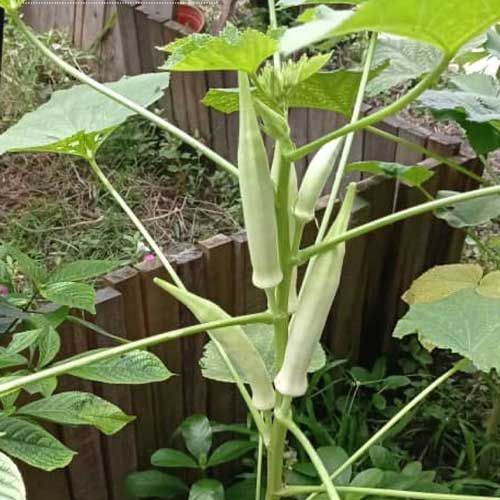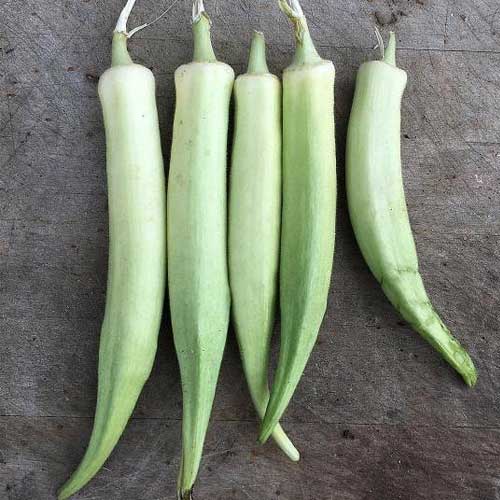Total Number of seeds: 30
Ladies Finger White Silver Queen Okra Seeds
Ladies Finger White Silver Queen Okra Seeds is a special heirloom variety that produces beautiful white-colored pods. Known for its high yield and tender pods, this native, open-pollinated seed is perfect for both home gardeners and commercial growers.
About This Item
- Type of Seeds: Heirloom, Open Pollinated, Native Seeds
- Germination Time: 7-14 days
- Hours of Sunlight: Needs 6-8 hours of full sunlight daily
- Where to Grow: Suitable for gardens or large pots
- Growing Season: Best grown in the spring or early summer
- Seeds Sowing Depth: 1/2 inch deep
- Ideal Climate: Warm, tropical climates
- Plant Height: Grows up to 3-5 feet tall
- Organic Fertilizer Requirement: Fertilize every 3-4 weeks with organic compost
- Life Span: Annual
- Ideal Growing Temperature: 20-35°C
- Harvesting Time: Ready for harvest 50-60 days after sowing
- Maintenance Required: Moderate pruning, regular watering
- Watering Frequency: Water regularly but avoid overwatering
- Ideal Grow Bag Size: 15-18 inches wide


What Size Grow Bag is Best for Ladies Finger
Growing Season in India
In India, Ladies Finger White Silver Queen Okra Seeds can be sown between February to April or June to August for optimal growth. These seasons provide the warmth needed for healthy plants and productive yields.
How to Grow in Pots
If you’re growing these seeds in pots, use a large pot with a diameter of at least 15-18 inches. Ensure the pot has proper drainage. Fill it with rich, well-drained soil and plant the seeds 1/2 inch deep. Place the pot in a sunny spot and water regularly to keep the soil moist but not soaked.
Seeds Sowing Method
- Preparation: Add compost to the soil to enrich it.
- Sowing: Sow seeds 1/2 inch deep with 12-18 inches spacing.
- Watering: Keep the soil moist but avoid waterlogging.
- Germination: Seeds will sprout in 7-14 days.
- Transplanting: Transplant seedlings once they are 4-6 inches tall.
Plant Care Tips
- Sunlight: Full sunlight is essential for good growth.
- Soil: Use well-drained, rich soil for the best results.
- Fertilization: Use organic fertilizer every 3-4 weeks to boost growth.
- Pruning: Regularly prune for healthy, strong plants.
- Support and Spacing: Make sure there is enough space for air circulation between plants.
- Pest Control: Monitor for pests and treat with organic pest control solutions if needed.
- Disease Prevention: Keep the soil well-drained to avoid fungal infections.
How to Fertilize Vegetable Plants Effectively
1. Apply Nutrient-Rich Fertilizers
When your plants begin flowering, use nutrient-rich fertilizers like Organic Bone Meal Powder or Vermicompost. This helps in boosting the bloom and enhances overall yield.
2. Use Organic Fertilizers
Feed your plants with organic fertilizers such as Cow Dung Manure or Neem Cake. Organic options promote healthy soil life.
3. Regular Feeding
Apply fertilizers every 20-25 days to ensure plants receive a steady supply of nutrients. Choose from various options like Cocopeat Compost for moisture retention.
Special Features
The White Silver Queen Okra variety stands out for its white-colored pods, which are not only beautiful but also tender and delicious. The plants are known for their high productivity, making them ideal for home gardens or small-scale farming.
Benefits/Uses
This variety of Ladies Finger is highly versatile in the kitchen. You can use the pods in soups, stir-fries, and curries. The tender white pods have a mild flavor, perfect for a variety of dishes. Their unique color also adds an appealing touch to your meals.
Precautions While Growing
- Watering: Make sure to water the plants regularly, but don’t overwater.
- Support: Tall plants may require light staking to prevent them from bending.
- Pests: Inspect the plants regularly for pests and treat them organically if necessary.
Common Problems Affecting Plants and Solutions
- Fungal Diseases: Ensure proper air circulation to prevent fungal growth.
- Pest Attacks: Treat with neem oil or organic insecticides if pests appear.
- Overwatering: Avoid waterlogging, which can lead to root rot.


Arun B
Seeds sprouted well and showed stable early growth.
Latha
The plant maintained a clean structure with consistent leaf development.
Vishal M
Moisture retention was good and no wilting signs appeared.
Smita
Sprouting smooth tha aur leaves fresh green tone me dikh rahe the.
Ramesh K
Sunlight me plants aur bright dikhne lage, growth me boost mila.
Nisha
Watering routine simple rakha aur plants ne accha respond diya.
Amit K
Plant pot me shift karte hi easily adjust ho gaya, koi stress nahi.
Rupika
seeds are perfect germination but i lost the plant due the over Rain
Geetha
The sprouts were bright and showed promising initial growth.
Shruthi
Germination was quick and the seedlings looked firm and healthy.